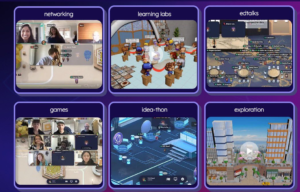What I’m Seeing: Show What You Know

It’s the beginning of the end of pointless post-secondary. Thousands of young people accumulated mountains of debt from college degrees that aren’t worth much–they didn’t learn much and they aren’t employable.
The last two days in GettingSmart.com I’ve discussed the increased focus on outcomes and the development of new options in the American post-secondary landscape. Today we’ll do a quick drive by of the emerging credentialing and skills verification space.
There are at least seven market drivers that make this a dynamic and important category:
- Online learning: In the very near future most post-secondary students will do at least some of their learning online. Increasingly high school and college students are blending their own learning by choosing from online options.
- Competency-based learning: K-12 is gradually shifting from a system based on time to a system based on learning. Higher ed will follow, particularly associate degree and certificate programs. Low cost higher ed options are following the lead of competency-based Western Governors University.
- Online assessment: moving tests online enables adaptive assessment (a shortcut to identifying learning levels) and on-demand end of course exams. Developments in essay scoring and richer performance tasks are enabling better and cheaper tests.
- Informal learning: the fact that almost anyone, anywhere (with broadband) can learn almost anything means more people learning stuff outside of school and looking for a skills recognition system like the Mozilla badge project.
- Job training: military and corporate employers have become much more sophisticated about creating rapid pathways to mastery. Outgrowths of the UK secondary testing system, often administered by Edexcel, have made certification common across the Commonwealth countries.
- Professional certification: there is a long history of using tests to certify professionals including doctors, lawyers, accountants.
- Hiring productivity: major employers continue to seek more effective means of surfacing and differentiating between candidates using reliable measures of knowledge and skills.
Like diplomas, credentialing is a market signalling activity–credentials tell the world what you know and can do. With all of the new learning options, it is becoming more important to have widely recognized means to show what you know and can do. For employees, skills verification includes a variety to make sure new hires can do the work.
There are three categories where I’m seeing more startup activity, let’s call them test, show, and go. (Sorry, I’m not identifying individual startups just yet.)
- Test: general and job specific business knowledge tests, approaches include standardized and crowdsource
- Show: portfolios and recommendations
- Go: career and learning management
We’ll also see an intersection between Common Core assessment (i.e., MasteryConnect, a Learn Capital portfolio company) and the whole badging and gamification movement. These achievement recognition systems will motivate and manage learning in competency-based environments.
A generation from now, the show-what-you-know category may be as important as diplomas. In the meantime, it will be fun to watch.
This blog first appeared on Huffington Post








Michael Linville
I agree that this trend is becoming more and more pronounced and that it's going to have a very positive impact on the state of higher ed for millions of learners, but I have to push back on your statement in the first paragraph:
"It’s the beginning of the end of pointless post-secondary. Thousands of young people accumulated mountains of debt from college degrees that aren’t worth much–they didn’t learn much and they aren’t employable."
The issue isn't with students that have graduated from college. If anything, college degrees have only become more and more valuable compared to years past. They have by far the lowest unemployment rate, higher wages, and while their debt burden is high, it is easily manageable for the most part.
The real problem in America is the students that begin college (thus incurring mountains of student loan debt) but do NOT graduate. These students don't receive near the same benefits in terms of wages or employment opportunities as their peers who get their degrees. This is where we as a nation need to accurately diagnose how we are failing these students (and the ones who aspire for post-secondary education but cannot for cost/quality/access reasons). This problem could be in preparing them for higher ed, trying to push too many students in classical 4 year universities, devaluing career-tech and community colleges, and an overall lack of quality alternative post-secondary education for recent high school graduates and adult learners. This is where programs like WGU really shine. Dr. Mark Milliron, Chancellor of WGU-Texas, admits openly that their program is not designed for a student fresh from high school that may be better suited for enrollment in a traditional 4 year university.
I think too much discourse has focused on the big bad ivory tower institutions that constantly raise their prices while not accommodating a wider, more diverse student population. In all likelihood, these institutions are underpriced for the value they provide for the students who DO graduate. Instead of trying to get them to change, we should be working for ways to build new institutions for the students not tailored for this classical form of higher education. This is where the real value are from the points in your post.
Here's a few pieces from NYT that talk about the costs and benefits for college in America: http://economix.blogs.nytimes.com/2011/11/04/college-is-cheaper-than-you-think/?ref=business ; http://economix.blogs.nytimes.com/2011/10/27/college-is-worth-it/ ; http://economix.blogs.nytimes.com/2011/07/22/college-is-still-worth-it/ ; http://economix.blogs.nytimes.com/2012/03/23/who-shouldnt-go-to-college/
Replies
Tom Vander Ark
Thanks Michael, in general it's much better to have a college degree than not. (I've devoted most of the last 20 years to boosting high school and college completion rates.) You're also correct that 'orphan students' that never complete a degree never gain most of the market value of participating in post-secondary education. My point is that the rapid increase in cost and the rise of open learning resources are both reducing the ROI on post-sec. We won't need to 'try to get them to change', market forces of disruptive innovation are taking care of that.
Mathew Miller
I agree that this is a major disruptive trend, worth watching. Howeve, I think an important aspect is getting missed in the discussion of new tools and "options" that currently is swirling around this area: unless we change how we fundamentally interact with our students, the new Test and Show tools will end up doing only slightly better than our existing tools, and the difference will decrease as the novelty wears off. In addition to the new tools, we need to be interacting with our students to discover what their passion is and help them develop that. Otherwise, tomorrow's Show version of the MBA will attract tons of students who care as little about their subject as today's MBA grads and who are as unfulfilled (and thus unsatisfied). We need to serve our students much better in this respect, or all the tols in the world will not help the majority who need help to discover their passion and start to follow it.
Replies
Tom Vander Ark
Thanks Matthew. It may be possible to 'cheat' or shortchange some show-what-you-know system but there's certainly a lot of folks gaming or sleeping through the time based system. I think we'll see a rather rapid decline in MBA degrees and an increase in on-the-job and JIT learning.